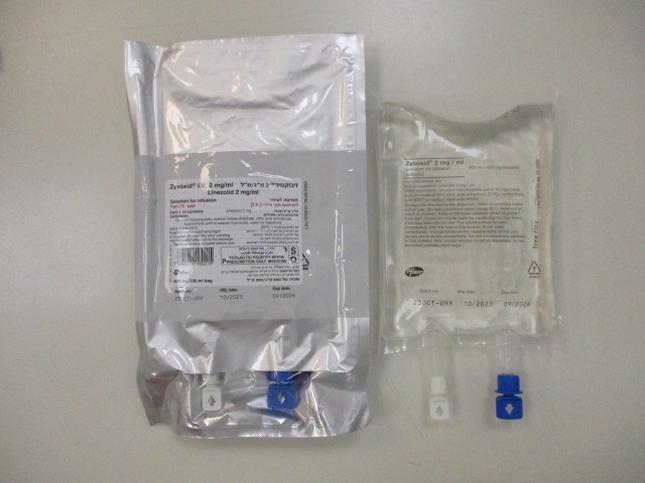Quest for the right Drug

זיבוקסיד 2 מ"ג/מ"ל ZYVOXID I.V. 2 MG/ML (LINEZOLID)
תרופה במרשם
תרופה בסל
נרקוטיקה
ציטוטוקסיקה
צורת מתן:
תוך-ורידי : I.V
צורת מינון:
תמיסה לאינפוזיה : SOLUTION FOR INFUSION
עלון לרופא
מינוניםPosology התוויות
Indications תופעות לוואי
Adverse reactions התוויות נגד
Contraindications אינטראקציות
Interactions מינון יתר
Overdose הריון/הנקה
Pregnancy & Lactation אוכלוסיות מיוחדות
Special populations תכונות פרמקולוגיות
Pharmacological properties מידע רוקחי
Pharmaceutical particulars אזהרת שימוש
Special Warning עלון לרופא
Physicians Leaflet
Posology : מינונים
4.2 Posology and method of administration Posology Zyvoxid® solution for infusion and tablets may be used as initial therapy. Patients who commence treatment on the parenteral formulation may be switched to either oral presentation when clinically indicated. In such circumstances, no dose adjustment is required as linezolid has an oral biovailability of approximately 100%. The solution for infusion should be administered over a period of 30 to 120 minutes. The tablets may be taken with or without food. The recommended linezolid dosage should be administered I.V. or orally twice daily. The recommended dosage for Zyvoxid® formulations for the treatment of infections is described in Table 1. Table 1. Dosage Guidelines for Zyvoxid Dosage and Route of Administration Recommended Pediatric Patients† Adults and Adolescents Duration of Treatment Infection* (Birth through 11 Years (12 Years and Older) (Consecutive days) of Age) Complicated skin and skin structure infections Community- acquired 10 mg/kg I.V. or oral‡ 600 mg I.V. or oral‡ q12h 10 to 14 pneumonia, q8h including concurrent bacteraemia Nosocomial pneumonia Vancomycin- resistant 10 mg/kg I.V. or oral‡ 600 mg I.V. or oral‡ q12h 14 to 28 Enterococcus q8h faecium infections, including concurrent bacteraemia Uncomplicated skin <5 yrs: 10 mg/kg oral‡ Adults: 400 mg oral‡ q12h and skin structure q8h Adolescents: 600 mg oral‡ 10 to 14 infections 5-11 yrs: 10 mg/kg oral‡ q12h q12h * Due to the designated pathogens (see Therapeutic indications) † Neonates <7 days: Most pre-term neonates < 7 days of age (gestational age < 34 weeks) have lower systemic linezolid clearance values and larger AUC values than many full-term neonates and older infants. These neonates should be initiated with a dosing regimen of 10 mg/kg q12h. Consideration may be given to the use of 10 mg/kg q8h regimen in neonates with a sub-optimal clinical response. All neonatal patients should receive 10 mg/kg q8h by 7 days of life (see PHARMACOLOGICAL PROPERTIES, Pharmacokinetic properties, Pediatric population). ‡ Oral dosing using Zyvoxid® Tablets Adult patients with infection due to MRSA should be treated with Zyvoxid® 600 mg q12h. In limited clinical experience, 5 out of 6 (83%) pediatric patients with infections due to Grampositive pathogens with MICs of 4 µg/ml treated with Zyvoxid® had clinical cures. However, pediatric patients exhibit wider variability in linezolid clearance and systemic exposure (AUC) compared with adults. In pediatric patients with a sub-optimal clinical response, particularly those with pathogens with MIC of 4 µg/ml, lower systemic exposure, site and severity of infection, and the underlying medical condition should be considered when assessing clinical response (see PHARMACOLOGICAL PROPERTIES, Pharmacokinetic properties, Pediatric population and CLINICAL PARTICULARS, Special warnings and precautions for use, Pediatric use). In controlled clinical trials, the protocol-defined duration of treatment for all infections ranged from 7 to 28 days. Total treatment duration was determined by the treating physician based on site and severity of the infection, and on the patient’s clinical response. No dose adjustment is necessary when switching from intravenous to oral administration. Patients whose therapy is started with Zyvoxid® I.V. Injection may be switched to Zyvoxid® Tablets at the discretion of the physician, when clinically indicated. Elderly patients: No dose adjustment is required. Female patients: No dose adjustment is required. Patients with renal insufficiency: No dose adjustment is required (see section 5.2). Patients with mild to moderate renal insufficiency: (i.e., CLCR> 30 ml/min): No dose adjustment is required. Patients with severe renal insufficiency CLCR < 30 ml/min): No dose adjustment is required. Due to the unknown clinical significance of higher exposure (up to 10 fold) to the two primary metabolites of linezolid in patients with severe renal insufficiency, linezolid should be used with special caution in these patients and only when the anticipated benefit is considered to outweigh the theoretical risk. As approximately 30% of a linezolid dose is removed during 3 hours of haemodialysis, linezolid should be given after dialysis in patients receiving such treatment. The primary metabolites of linezolid are removed to some extent by haemodialysis, but the concentrations of these metabolites are still very considerably higher following dialysis than those observed in patients with normal renal function or mild to moderate renal insufficiency. Therefore, linezolid should be used with special caution in patients with severe renal insufficiency who are undergoing dialysis and only when the anticipated benefit is considered to outweigh the theoretical risk. To date, there is no experience of linezolid administration to patients undergoing continuous ambulatory peritoneal dialysis (CAPD) or alternative treatments for renal failure (other than haemodialysis). Patients with impaired hepatic function: No dose adjustment is required. However, there are no pharmacokinetic data and limited clinical experience of linezolid in patients with severe hepatic insufficiency. Linezolid should be used with special caution in patients with severe hepatic insufficiency and only when the anticipated benefit is considered to outweigh the theoretical risk.

שימוש לפי פנקס קופ''ח כללית 1994
לא צוין
תאריך הכללה מקורי בסל
לא צוין
הגבלות
לא צוין
מידע נוסף
